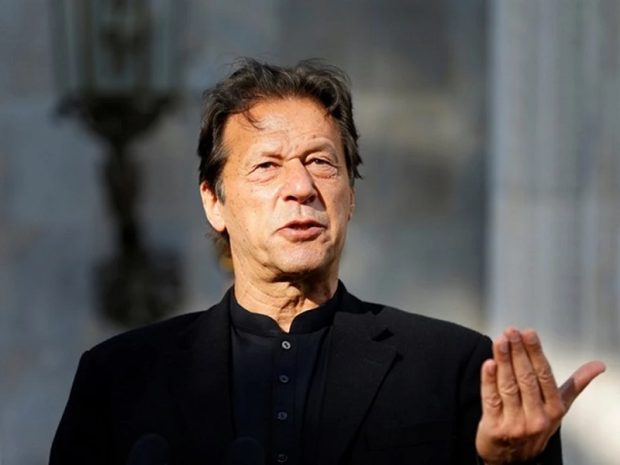
Pak PM Imran says graft, sex crimes main evils confronting Muslim world
Team Udayavani, Jan 3, 2022, 2:01 PM IST

Pakistan Prime Minister Imran Khan (File Photo) (Credit: ANI)
Islamabad: Pakistan Prime Minister Imran Khan has said that rising corruption and sex crimes were the two main evils confronting the Muslim world.
He said this during an interactive dialogue on ‘Riyasat-i-Madina: Islam, Society and Ethical Revival’ with top Muslim scholars from the world on Sunday, which was organised by the recently set up National Rehmatul-lil-Aalameen Authority (NRAA).
Khan in October formed the NRAA for researching how best to disseminate lessons from the life of the Prophet to the masses.
The scholars presented their views on how the youth could be protected from the invasion of social media on their faith and religious and ethical values.
“There are two sorts of crimes in the society, one is corruption and the other is sex crime. Sex crime has risen sharply in our society, i.e. rape and child abuse and only one per cent of this is reported,” Khan said.
“The other 99 per cent, I believe, society has to fight it. The same is the case with corruption… Society has to make corruption unacceptable. Unfortunately, when you have leadership which is corrupt over time, they make corruption acceptable,” the prime minister said, apparently taking a dig at his predecessor Nawaz Sharif, head of the Pakistan Muslim League-Nawaz (PML-N).
Sharif, 72, is in London since November 2019 after the Lahore High Court granted him permission to go abroad for four weeks for treatment. The three-time premier, his daughter Maryam and son-in-law Muhammad Safdar were convicted in the Avenfield properties case on July 6, 2018.
Sharif was also sentenced to seven years in the Al-Azizia Steel Mills case in December 2018. But, he was bailed out in both cases and also allowed to go to London for medical treatment.
The Dawn newspaper reported that while seeking viewpoints of the international scholars, Khan hinted that he would be holding similar dialogues with renowned scholars in the future as well.
He stressed the need to save the Muslim youth from being inundated with obscenity and pornographic material available on the internet.
The scholars suggested certain collective efforts by the Muslim countries to counter the negative effects of modernity.
Dr Seyyed Hossein Nasr, University Professor of Islamic Studies at the George Washington University, said: “Today, the world is a more precarious and dangerous place for the youth”.
He denounced western elements that talked about Islam in a negative tone, which he said was tantamount to attacking the religion.
Shaykh Hamza Yusuf, an American scholar, likened the issue of corruption to a rotten apple which could decay a society.
He said that the Holy Quran had explained the issue of corruption and its impact upon individuals and society.
He was of the opinion that Islam had tasked men to take care of women and children in society.
He stressed that young people should be taught to honour women.
“Not going to places that you shouldn’t be, that onus is first and foremost on the men and we can’t blame the victims. At the same time women need to understand there are wolves out there and those wolves are real,” he said.
Dr Abdal Hakim Murad, dean of the Cambridge Muslim College, said information on mobile phones for the young generations was a real challenge for most of societies across the globe.
“Everybody knows the key trigger has been the availability, even to young children, of high-resolution images of things that should be private and not made part of public entertainment.
“If the adolescent mind grows up recurrently addicted to these images, neuroscientists have pointed out that this results in permanent damage,” he said, as he regretted that the internet was not something that could be regulated by individual nation states.
Dr Osman Bakar from the University of Malaysia emphasised the need for interfaith and intercultural dialogue, which he said would bring stability.
Sheikh Abdullah bin Bayyah, chairman of the UAE’s Fatwa Council, said: “We are living in the age of globalisation and the advent of social media, internet and other modern concepts has a huge impact upon the youth.” He suggested the idea of seeking ‘Sakinah’ by the youth, which means peacefulness of mind.
According to him, it is the quality of soul that helps remove agitation from a person’s mind.
He underlined the need for the establishment of a university for Muslim youth that could focus on teaching morals and ethics.
Udayavani is now on Telegram. Click here to join our channel and stay updated with the latest news.
Top News

Related Articles More

Trump says India charges lot of tariff, threatens to impose reciprocal tax

Cyclone Chido hits French territory of Mayotte; Death toll is ‘several hundred,’ top official says

Sheikh Hasina mounts fresh attacks on Muhammad Yunus; accuses him of leading an “undemocratic group”

Tabla maestro Zakir Hussain in San Francisco ICU with heart problems

Ousted PM Sheikh Hasina involved in enforced disappearance: Bangladesh commission
MUST WATCH
Latest Additions

Assembly clears Mysuru Development Authority Bill

Blocked 18 OTT platforms for publishing obscene, vulgar content: Govt

Boy critically injured after tree branch falls on him in Bengaluru

Congress claims party worker ‘died due to tear gas smoke’ during protest in Assam

Four dead in road accident in Kolar
Thanks for visiting Udayavani
You seem to have an Ad Blocker on.
To continue reading, please turn it off or whitelist Udayavani.



















